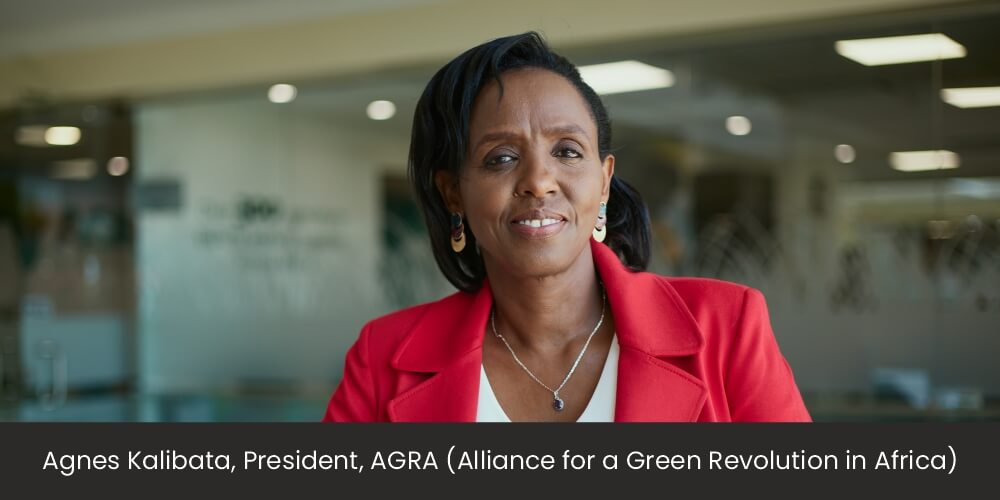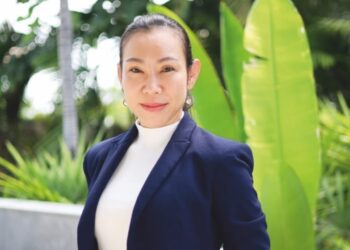Dr. Agnes Kalibata is a distinguished leader, renowned for her transformative impact in agricultural development and policy across Africa. Serving as the President of AGRA (Alliance for a Green Revolution in Africa), Dr. Kalibata has dedicated her career to advancing sustainable food systems and enhancing the livelihoods of millions of smallholder farmers.
Dr. Kalibata’s journey is rooted in a deep commitment to addressing the challenges of poverty and food insecurity. From her early experiences in a refugee camp, she gained profound insights into the struggles of marginalized communities, igniting her passion for driving transformative change. With a doctorate in Entomology from the University of Massachusetts, Amherst, Dr. Kalibata’s academic background laid the foundation for her illustrious career.
Her leadership roles, including serving as the Minister of Agriculture and Animal Resources for Rwanda, exemplify her visionary approach to agricultural development. Under her guidance, Rwanda experienced a remarkable transformation in food security, transitioning from a state of deficit to becoming a food-secure nation within a short span of time. Dr. Kalibata’s strategic investments in data infrastructure, technology, and targeted interventions have contributed to significant improvements in agricultural productivity and livelihoods.
As the President of AGRA, Dr. Kalibata continues to champion inclusive food systems transformation across Africa. Through collaborative efforts with governments, the private sector, and other partners, AGRA is facilitating sustainable growth and enhancing food security for millions of households. Dr. Kalibata’s leadership extends beyond AGRA, as she also served as the Special Envoy of the UN Secretary-General for the 2021 Food Systems Summit. In this role, she played a pivotal role in mobilizing global stakeholders to address the challenges facing food systems worldwide and achieve the SDGs and Paris Agreement targets.
Dr. Agnes Kalibata’s remarkable journey and unwavering commitment to agricultural development serve as an inspiration to leaders and change-makers worldwide. Her visionary leadership and tireless advocacy continue to drive transformative change, shaping a more food-secure and prosperous future for Africa and beyond.
Below are highlights of the interview:
Tell us about AGRA and its mission.
Founded in 2006, AGRA, formerly known as the Alliance for Green Revolution is an African-led, African- based organisation that seeks to catalyse Agriculture Transformation in Africa. AGRA is focused on putting smallholder farmers at the centre of the continent’s growing economy by transforming agriculture from a solitary struggle to survive into farming as a business that thrives. As the sector that employs most of Africa’s people, nearly all of them small-scale farmers, AGRA recognises that developing smallholder agriculture into a productive, efficient, and sustainable system is essential to ensuring food security, lifting millions out of poverty and driving equitable growth across the continent.
Our mission at AGRA is to drive the growth of sustainable food systems across Africa by influencing and leveraging partners to cultivate a robust enabling environment where the private sector flourishes, and smallholder farmers are empowered to produce sufficient, nutritious food. We prioritise smallholder farmers, recognising that no country has transitioned from low-income to middle-income without undergoing agricultural transformation. We achieve this by collaborating with partners ranging from governments and non-governmental organisations to private sector businesses and more.
In our recently launched five-year strategy (2023-2027), our objectives are to empower and fortify the resilience of smallholder farmers, foster the development of inclusive markets and finance to bolster agricultural systems and enhance state capability to sustain food systems transformation.
To realise our vision, mission, and strategic objectives, we have identified four interconnected business lines to catalyse food systems transformation:
- Our Policy and State capability business line reflects our understanding that agricultural transformation cannot be achieved without clear government leadership. We support governments in developing clear policies and strong capabilities that create the enabling environment for private sector involvement in agricultural transformation.
- Our Seed Systems business line is a continuation of our work to drive crop productivity via seeds, understanding that seeds are a critical “trigger point” to improving incomes and food security.
- Our Sustainable Farming business line ensures that farmers are building resilient farming systems which enable them to sustain improved yields, and profit from them amidst shocks like pests, climate and weather vulgarizes.
- Our Inclusive Markets and Trade business line focuses on strengthening viable and inclusive local and regional agri-food markets, acknowledging this is a critical “pull” factor for farmers and businesses to enter a positive, sustained cycle of commercialisation and reinvestment.
These business lines are intricately interconnected, reinforcing one another to drive positive agricultural food systems transformation across Africa.
How did you initially get involved in the industry, and what motivated you to pursue a career in this field?
My leadership journey in ag began in the heart of Rwanda’s agricultural sector—a sector that is not merely an economic engine but also a lifeline for the majority, especially those in rural communities. Post-genocide reconstruction prioritised food security and poverty alleviation, underscoring agriculture’s pivotal role. It wasn’t solely about putting food on tables; it was about driving economic growth, reducing poverty, and offering hope and transformation to our people.
As a public servant of Africa and the world, I have always believed in humanity’s capacity to uplift societies and individual lives through a blend of science, policies, programmes, and investments. Throughout my diverse leadership roles, I’ve carried forward lessons from the agricultural sector—principles of inclusivity, resilience, and a steadfast commitment to improving livelihoods have shaped my leadership style.
Moreover, my career has taught me about Africa’s boundless potential—a continent brimming with untapped opportunities and resources awaiting harnessing for our people’s benefit. Yet, realising these potential demands collaboration and the ability to craft solutions tailored to our unique challenges. Together, we can unlock Africa’s promise and pave the way for a brighter future.
How do you foster a culture of innovation and adaptability within your organisation, considering the rapidly changing landscape of the business industry?
Indeed, the business landscape is rapidly changing, especially in the agricultural sector. Today, more than ever, Africa faces the threat of hunger. According to the State of Food Security and Nutrition in the World 2022 report, hunger is expanding fastest in Africa compared to other regions, with the continent expected to house more than half of the world’s chronically hungry population by 2030. Against this backdrop, our new strategy is geared towards bolstering the resilience of African nations against emerging global shocks, stresses, and the enduring impacts of climate change and land degradation. Additionally, we are placing a renewed focus on addressing the nutrition needs of the continent.
Prior to this, our priorities were different. In our first strategy, we emphasised laying the foundation for agricultural transformation across Africa. With our second strategy, we broadened our scope to address the binding constraints at the farmer level, national level, and within agricultural systems.
By continually revising our strategies, informed by the successes and key learnings from previous iterations, we cultivate a culture of adaptability and innovation in an ever-evolving business environment.
As President, what is your overall vision for the company’s future, and how do you plan to achieve it?
My overarching vision for the organisation’s future is to lead the transformation of food systems in Africa. I envision AGRA enhancing its pivotal role in driving tangible impact and sustainable change across the continent. We want Africa to feed herself and for the farmer to make a substantial living from farming, sustainably.
Central to this vision is the recognition of the critical importance of food security and agricultural development in Africa. By leveraging our expertise, resources, and partnerships, I believe AGRA can catalyse a paradigm shift in how food is produced, distributed, and consumed in the region.
I believe that this strategy addresses the issues that we need to focus on to bring about food systems transformation, and at AGRA, we have the right partnerships and resources in place to bring about food systems transformation.
What advice would you give to aspiring leaders or individuals looking to join the industry?
First, embrace the concept of lifelong learning. From my experience, I have come to learn that agriculture is a field that constantly evolves; hence, one needs to remain curious and committed to expanding their knowledge through education, workshops, and networking opportunities. Continuously adapting and learning new skills will be crucial for navigating the complexities of this dynamic industry.
Secondly, alone, we go fast; together, we go far. I have learnt time and again the value of partnerships. As an organisation and as an individual, I purpose to work together with other like-minded parties to achieve the objectives set out.
Lastly, sustainability is increasingly important in agriculture. Recognise the significance of sustainable practices that protect the environment, promote social equity, and ensure economic viability. Integrate resilience into your decision-making processes and advocate for responsible stewardship of natural resources.





